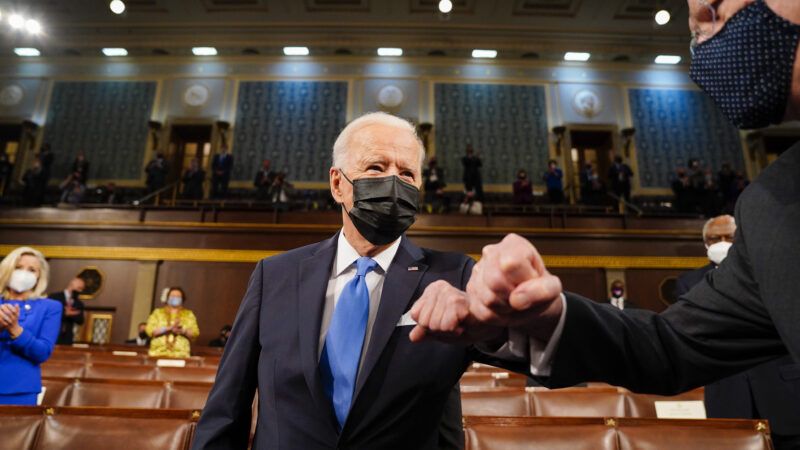If Biden Is Serious About Criminal Justice Reform, He Needs To Get Serious About Qualified Immunity
The doctrine shields state actors from accountability.

"We have all seen the knee of justice on the neck of black Americans. Now is the opportunity to make real progress," said President Joe Biden on Wednesday, addressing the nation after his first 100 days in the Oval Office. "My fellow Americans, we have to come together to rebuild trust between law enforcement and the people they serve."
That conversation returned to the forefront following the guilty verdict of Derek Chauvin, the former Minneapolis police officer now convicted of murdering George Floyd. In that vein, the federal government has arguably never been this close to passing major police reform that would unravel some of the tough-on-crime policies popular a mere two decades ago, and long championed by Biden.
"We need to work together to find a consensus but let us get it done next month by the first anniversary of George Floyd's death," said Biden, in a speech heavy on platitudes and light on policy specifics. And there is a particular policy debate that could throw a wrench in his timeline: qualified immunity, the legal doctrine that makes it unreasonably difficult to file a lawsuit against a state actor accused of misconduct.
Conjured out of thin air by the high court, it requires that any misconduct alleged against a government official be "clearly established" in a pre-existing court precedent in order for a victim to secure permission to simply make their case before a jury. Qualified immunity has protected two cops who allegedly stole $225,000 during a search warrant, a cop who shot a teenage boy on his way to school, two cops who arrested and assaulted a man for standing outside of his own house, a cop who decimated a man's car during a bogus drug search, and a college administrator who flouted a student's free speech rights, among others.
Unfortunately, qualified immunity became the flashpoint in the discussion surrounding criminal justice reform last summer. Republicans were unwilling to pass any reform that scaled back qualified immunity, and Democrats wouldn't vote for a bill unless it did.
As the Senate reconsiders the George Floyd Justice in Policing Act, which Biden would likely sign, that GOP reluctance appears to be softening. Tim Scott (R–S.C.) offered a compromise this month that would curtail qualified immunity for law enforcement officers if the departments themselves, rather than the offending officers, are held liable.
It's unclear if the reform will pass, as Democrats will need to overcome the filibuster and court support from at least 10 Republicans. They will also need to address skepticism from those in their coalition on this issue, some of whom say the compromise isn't really a compromise at all.
"Republicans pride themselves as the party of individual responsibility and personal accountability," says Clark Neily, senior vice president for criminal justice at the Cato Institute. "A policy that would prevent police officers from being held liable for their own misconduct—and leave taxpayers to pick up the tab—is the very antithesis of those values. Everyone should be responsible for the harms they inflict on others, whether or not they wear a badge."
Biden talked a big game Wednesday evening, rebuking what he cast as white supremacist terrorism. On the campaign trail, however, he was measured on this topic, expressing in meetings that he wasn't yet ready to end qualified immunity outright. But to get serious on criminal justice reform will require him to get serious on qualified immunity.


Show Comments (17)